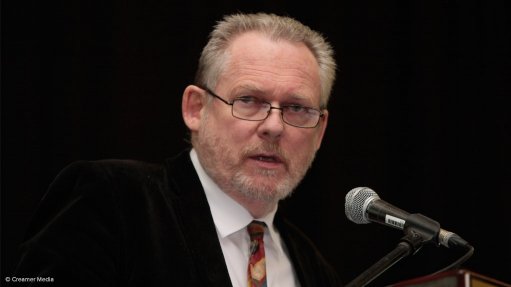
Trade and Industry Minister Rob Davies
With fronting emerging as one of the “biggest abuses” of South Africa’s Broad-Based Black Economic Empowerment (BBBEE) Act of 2003, the newly established B-BBEE Commission will provide government with the teeth to tackle what it effectively deems as fraudulent.
Speaking to BBBEE Commission conference delegates through a video link-up on Tuesday, Trade and Industry Minister Dr Rob Davies noted that fronting had become much more complex over time, embedding itself in several aspects of the country’s economic fabric, rolling back ambitions for economic empowerment and reversing the gains of transformation.
Davies said that the BBBEE Act had been amended in 2013 to introduce monitoring mechanisms to properly implement the legislation and introduce strategies to combat fronting, among other inhibiting challenges.
In addition to limited access to finance and markets, fronting had significantly hampered the economic participation of the previously disadvantaged, as companies fraudulently chased higher BBBEE status, leaving South Africa with a “very slow and disappointing” pace of transformation, added Trade and Industry Deputy Minister Mzwandile Masina.
Since the 2003 promulgation of the BBBEE Act, “unacceptably” fragmented, and in some cases zero, progress in real transformation had been made and the time had come to take action against those undertaking fronting activities, vowed Masina.
He told delegates that, while the policies and laws to enable transformation were in place, the country needed to accelerate its ambitions to radically overhaul its economy and close all the “loopholes.
“Fronting is fraud and will not be tolerated,” said Masina of the activity which was determined as criminal in the 2013 amendments of the BBBEE Act.
Citing several studies, Masina noted that the equity holding by black people on the JSE was at 3%, and that only 13.6% of top management positions and 21% of senior management positions were held by the previously disadvantaged. Further, there was a decline – from 15% in 2012 to 10% currently – in the number of black CEOs measured among the top 40 JSE-listed companies.
Meanwhile, the enactment of the BBBEE Amendment Act 46 of 2013 had led to the creation of the BBBEE Commission, which aimed to inhibit practices that undermined the BBBEE Act and to oversee its “correct” implementation.
In February, Davies had opened the Draft Regulations that would prescribe the processes for the operations of the BBBEE Commission, including processes for the handling and investigation of complaints, for public comment.
BBBEE Commission commissioner Zodwa Ntuli said that the Department of Trade and Industry-established entity had already kicked off operations and would now embark on an educational awareness programme to clarify its strategy moving forward, which included narrowing the commission’s focus on gaps that existed since the implementation of BBBEE and closing these loopholes.
“We have a much . . . stronger Act that has teeth . . . and now will start biting [as we] bring to book those benefiting unlawfully,” Masina said, vowing that progress would be made.
Portfolio Committee on Trade and Industry chairperson Joan Fubbs agreed that the Amendment provided the Commission with the means to eradicate fronting. She welcomed the establishment of the commission and the appointment of a permanent commissioner.
She noted that, with South Africa committed to building a society with “real” entrepreneurs and not just presenting surface ownership, the codes of best practice, legislation and policies had been “tightened” up.
Fubbs added that South Africa needed to place inclusive productive activity at the forefront of the economy, appealing to organisations to stop “window dressing”, as the country could no longer afford the consequences of “economic gymnastic manoeuvres.”